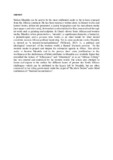Please use this identifier to cite or link to this item:
https://cris.library.msu.ac.zw//handle/11408/993Full metadata record
| DC Field | Value | Language |
|---|---|---|
| dc.contributor.author | Rwafa, Urther | - |
| dc.date.accessioned | 2016-04-24T14:39:03Z | - |
| dc.date.available | 2016-04-24T14:39:03Z | - |
| dc.date.issued | 2015 | - |
| dc.identifier.issn | 2078-9785 | - |
| dc.identifier.uri | http://hdl.handle.net/11408/993 | - |
| dc.description.abstract | Nelson Mandela can be said to be the most celebrated leader so far to have emerged from the African continent. He has been variously written about in literary works and history books, differently presented in [auto] biographies and the mainstream media [newspapers and television], fictionalized and actualised in film, immortalised through art work such as painting and sculpture. In liberal- driven South African and western media, Mandela is/was presented as a ‘messiah’, a superhuman character, a humanist, a philanthropist, and a persona who works as an ideal model for what should constitute modem African political leadership. Yet in some academic circles Mandela is viewed as “a terrorist-turned-politician” (Willcock, 2013: 1), a political and ideological ‘construct’ of the western world; a framed 'dramatis persona ’ by the western media to project and deepen the colonialist agenda in Africa. This article seeks to theorise Mandela and in the process draw some justifications to the worthiness or the shallowness of labels attributed to Mandela as a symbolic figure that embodied the values of “Africanness” and “ubuntuism” or as an “African Cyborg” that was created and controlled by the western world. The article also attempts to locate and expose to the surface the different layers of present day South African challenges—which can be attributed to the legacy left by Mandela, but are often concealed by the ruling government under the carpet of “Rainbow Nation” and a blind celebration of “National reconciliation”. | en_US |
| dc.language.iso | en | en_US |
| dc.publisher | Unisa Press | en_US |
| dc.relation.ispartofseries | Imbizo International Journal of Literary and Comparative Studies;Vol. 15, no. 1 | - |
| dc.subject | Theorising Mandela | en_US |
| dc.subject | South Africa | en_US |
| dc.subject | Western media | en_US |
| dc.subject | African leadership | en_US |
| dc.subject | National reconciliation | en_US |
| dc.title | Theorising Mandela | en_US |
| dc.type | Article | en_US |
| item.openairecristype | http://purl.org/coar/resource_type/c_18cf | - |
| item.cerifentitytype | Publications | - |
| item.grantfulltext | open | - |
| item.languageiso639-1 | en | - |
| item.fulltext | With Fulltext | - |
| item.openairetype | Article | - |
| Appears in Collections: | Research Papers | |
Files in This Item:
| File | Description | Size | Format | |
|---|---|---|---|---|
| ABSTRACT theorising mandela.pdf | 467.29 kB | Adobe PDF |  View/Open |
Items in MSUIR are protected by copyright, with all rights reserved, unless otherwise indicated.


